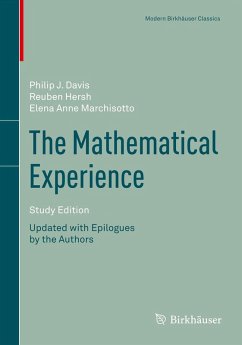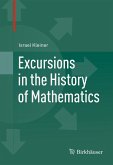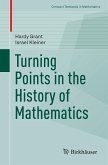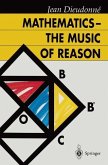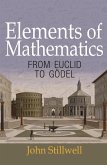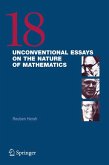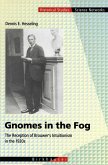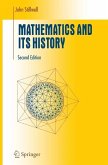Winner of the 1983 National Book Award, The Mathematical Experience presented a highly insightful overview of mathematics that effectively conveyed its power and beauty to a large audience of mathematicians and non-mathematicians alike. The study edition of the work followed about a decade later, supplementing the original material of the book with exercises to provide a self-contained treatment usable for the classroom.
This softcover version reproduces the study edition and includes epilogues by the three original authors to reflect on the book's content 15 years after its publication, and to demonstrate its continued applicability to the classroom. Moreover, The Companion Guide to the Mathematical Experience-originally published and sold separately-is freely available online to instructors who use the work, further enhancing its pedagogical value and making it an exceptionally useful and accessible resource for a wide range of lower-level courses in mathematics and mathematics education.
A wealth of customizable online course materials for the book can be obtained from Elena Anne Marchisotto (elena.marchisotto@csun.edu) upon request.
Reviews
[The authors] have tried to provide a book usable in a course for liberal arts students and for future secondary teachers. They have done much more! This course should be required of every undergraduate major employing the mathematical sciences. It differs from the "mathematics appreciation" courses-courses that are merely a collection of amusing puzzles and toy problems giving an illusion of a mathematical encounter-presently found in many institutions. Students of this course are introduced to the context in which mathematics exists and the incredible magnitude of words devoted to communicating mathematics (hundreds of thousands of theoremseach year). How much mathematics can there be? they are asked. Instructors in a "Mathematical Experience" course must be prepared to respond to questions from students concerning the fundamental nature of the whole mathematical enterprise. Stimulated by their reading of the text, students will ask about the underlying logical and philosophical issues, the role of mathematical methods and their origins, the substance of contemporary mathematical advances, the meaning of rigor and proof in mathematics, the role of computational mathematics, and issues of teaching and learning. How real is the conflict between "pure" mathematics, as represented by G.H. Hardy's statements, and "applied" mathematics? they may ask. Are there other kinds of mathematics, neither pure nor applied? This edition of the book provides a source of problems, collateral readings, references, essay and project assignments, and discussion guides for the course. I believe that it is likely that this course would be a challenge to many teachers and students alike, especially those teachers and students who are willing to follow their curiosity beyond the confines of this book and follow up on the many references that are provided. -Notices of the AMS (Kenneth C. Millett)
This beautifully written book can be recommended to any cultivated person with a certain sophistication of thought, and also to the practicing mathematician who will find here a vantage point from which to make a tour d'horizon of his science. -Publ. Math. Debrecen
This is an unusual book, being more a book about mathematics than a mathematics book. It includes mathematical issues, but also questions from the philosophy of mathematics, the psychology of mathematical discovery, the history of mathematics, and biographies of mathematicians, in short, a bookabout the mathematical experience broadly considered... The book found its way into "Much for liberal arts students" courses and into education courses directed at future teachers. Term paper topics, essay assignments, problems, computer applications, and suggested readings are included. This new material should greatly enhance the usefulness of this very creative book. The range of topics covered is immense and the contents cannot easily be summarized. The book makes excellent casual reading, would make a good textbook, or could easily be used as a supplement to nearly any course concerned with mathematics. -Zentralblatt MATH
This softcover version reproduces the study edition and includes epilogues by the three original authors to reflect on the book's content 15 years after its publication, and to demonstrate its continued applicability to the classroom. Moreover, The Companion Guide to the Mathematical Experience-originally published and sold separately-is freely available online to instructors who use the work, further enhancing its pedagogical value and making it an exceptionally useful and accessible resource for a wide range of lower-level courses in mathematics and mathematics education.
A wealth of customizable online course materials for the book can be obtained from Elena Anne Marchisotto (elena.marchisotto@csun.edu) upon request.
Reviews
[The authors] have tried to provide a book usable in a course for liberal arts students and for future secondary teachers. They have done much more! This course should be required of every undergraduate major employing the mathematical sciences. It differs from the "mathematics appreciation" courses-courses that are merely a collection of amusing puzzles and toy problems giving an illusion of a mathematical encounter-presently found in many institutions. Students of this course are introduced to the context in which mathematics exists and the incredible magnitude of words devoted to communicating mathematics (hundreds of thousands of theoremseach year). How much mathematics can there be? they are asked. Instructors in a "Mathematical Experience" course must be prepared to respond to questions from students concerning the fundamental nature of the whole mathematical enterprise. Stimulated by their reading of the text, students will ask about the underlying logical and philosophical issues, the role of mathematical methods and their origins, the substance of contemporary mathematical advances, the meaning of rigor and proof in mathematics, the role of computational mathematics, and issues of teaching and learning. How real is the conflict between "pure" mathematics, as represented by G.H. Hardy's statements, and "applied" mathematics? they may ask. Are there other kinds of mathematics, neither pure nor applied? This edition of the book provides a source of problems, collateral readings, references, essay and project assignments, and discussion guides for the course. I believe that it is likely that this course would be a challenge to many teachers and students alike, especially those teachers and students who are willing to follow their curiosity beyond the confines of this book and follow up on the many references that are provided. -Notices of the AMS (Kenneth C. Millett)
This beautifully written book can be recommended to any cultivated person with a certain sophistication of thought, and also to the practicing mathematician who will find here a vantage point from which to make a tour d'horizon of his science. -Publ. Math. Debrecen
This is an unusual book, being more a book about mathematics than a mathematics book. It includes mathematical issues, but also questions from the philosophy of mathematics, the psychology of mathematical discovery, the history of mathematics, and biographies of mathematicians, in short, a bookabout the mathematical experience broadly considered... The book found its way into "Much for liberal arts students" courses and into education courses directed at future teachers. Term paper topics, essay assignments, problems, computer applications, and suggested readings are included. This new material should greatly enhance the usefulness of this very creative book. The range of topics covered is immense and the contents cannot easily be summarized. The book makes excellent casual reading, would make a good textbook, or could easily be used as a supplement to nearly any course concerned with mathematics. -Zentralblatt MATH
Dieser Download kann aus rechtlichen Gründen nur mit Rechnungsadresse in A, B, BG, CY, CZ, D, DK, EW, E, FIN, F, GR, HR, H, IRL, I, LT, L, LR, M, NL, PL, P, R, S, SLO, SK ausgeliefert werden.
From the reviews:
[The authors] have tried to provide a book usable in a course for liberal arts students and for future secondary teachers. They have done much more! This course should be required of every undergraduate major employing the mathematical sciences. It differs from the "mathematics appreciation" courses-courses that are merely a collection of amusing puzzles and toy problems giving an illusion of a mathematical encounter-presently found in many institutions. Students of this course are introduced to the context in which mathematics exists and the incredible magnitude of words devoted to communicating mathematics (hundreds of thousands of theorems each year). How much mathematics can there be? they are asked. Instructors in a "Mathematical Experience" course must be prepared to respond to questions from students concerning the fundamental nature of the whole mathematical enterprise. Stimulated by their reading of the text, students will ask about the underlying logical and philosophical issues, the role of mathematical methods and their origins, the substance of contemporary mathematical advances, the meaning of rigor and proof in mathematics, the role of computational mathematics, and issues of teaching and learning. How real is the conflict between "pure" mathematics, as represented by G.H. Hardy's statements, and "applied" mathematics? they may ask. Are there other kinds of mathematics, neither pure nor applied? This edition of the book provides a source of problems, collateral readings, references, essay and project assignments, and discussion guides for the course. I believe that it is likely that this course would be a challenge to many teachers and students alike, especially those teachers and students who are willing to follow their curiosity beyond the confines of this book and follow up on the many references that are provided. -Notices of the AMS (Kenneth C. Millett)
This beautifully written book can be recommended to any cultivated person with a certain sophistication of thought, and also to the practicing mathematician who will find here a vantage point from which to make a tour d'horizon of his science. -Publ. Math. Debrecen
This is an unusual book, being more a book about mathematics than a mathematics book. It includes mathematical issues, but also questions from the philosophy of mathematics, the psychology of mathematical discovery, the history of mathematics, and biographies of mathematicians, in short, a book about the mathematical experience broadly considered... The book found its way into "Much for liberal arts students" courses and into education courses directed at future teachers. Term paper topics, essay assignments, problems, computer applications, and suggested readings are included. This new material should greatly enhance the usefulness of this very creative book. The range of topics covered is immense and the contents cannot easily be summarized. The book makes excellent casual reading, would make a good textbook, or could easily be used as a supplement to nearly any course concerned with mathematics. -Zentralblatt MATH
"This is a reprint of the 1995 edition ... of a well-known and popular text. In a new edition, each of the authors added a brief essay in the end. ... A warmly welcomed reprint of a very nice book that can be recommended for teaching, self-education, and simply as an entertaining reading." (Svitlana P. Rogovchenko, Zentralblatt MATH, Vol. 1230, 2012)
"The Mathematical Experience is a very interesting read - it provides a highly personal tour through aspects of mathematics, its history, its philosophy, and its relationship with the 'real' world. As such it provides a nice glimpse into how two mathematicians thought about their discipline as of some 30 years ago. ... a worthy addition to the librariesof mathematicians interested in the scope and nature of our discipline. ... I really enjoyed reading The Mathematical Experience and would recommend it for college and personal libraries." (Richard J. Wilders, The Mathematical Association of America, March, 2012)
[The authors] have tried to provide a book usable in a course for liberal arts students and for future secondary teachers. They have done much more! This course should be required of every undergraduate major employing the mathematical sciences. It differs from the "mathematics appreciation" courses-courses that are merely a collection of amusing puzzles and toy problems giving an illusion of a mathematical encounter-presently found in many institutions. Students of this course are introduced to the context in which mathematics exists and the incredible magnitude of words devoted to communicating mathematics (hundreds of thousands of theorems each year). How much mathematics can there be? they are asked. Instructors in a "Mathematical Experience" course must be prepared to respond to questions from students concerning the fundamental nature of the whole mathematical enterprise. Stimulated by their reading of the text, students will ask about the underlying logical and philosophical issues, the role of mathematical methods and their origins, the substance of contemporary mathematical advances, the meaning of rigor and proof in mathematics, the role of computational mathematics, and issues of teaching and learning. How real is the conflict between "pure" mathematics, as represented by G.H. Hardy's statements, and "applied" mathematics? they may ask. Are there other kinds of mathematics, neither pure nor applied? This edition of the book provides a source of problems, collateral readings, references, essay and project assignments, and discussion guides for the course. I believe that it is likely that this course would be a challenge to many teachers and students alike, especially those teachers and students who are willing to follow their curiosity beyond the confines of this book and follow up on the many references that are provided. -Notices of the AMS (Kenneth C. Millett)
This beautifully written book can be recommended to any cultivated person with a certain sophistication of thought, and also to the practicing mathematician who will find here a vantage point from which to make a tour d'horizon of his science. -Publ. Math. Debrecen
This is an unusual book, being more a book about mathematics than a mathematics book. It includes mathematical issues, but also questions from the philosophy of mathematics, the psychology of mathematical discovery, the history of mathematics, and biographies of mathematicians, in short, a book about the mathematical experience broadly considered... The book found its way into "Much for liberal arts students" courses and into education courses directed at future teachers. Term paper topics, essay assignments, problems, computer applications, and suggested readings are included. This new material should greatly enhance the usefulness of this very creative book. The range of topics covered is immense and the contents cannot easily be summarized. The book makes excellent casual reading, would make a good textbook, or could easily be used as a supplement to nearly any course concerned with mathematics. -Zentralblatt MATH
"This is a reprint of the 1995 edition ... of a well-known and popular text. In a new edition, each of the authors added a brief essay in the end. ... A warmly welcomed reprint of a very nice book that can be recommended for teaching, self-education, and simply as an entertaining reading." (Svitlana P. Rogovchenko, Zentralblatt MATH, Vol. 1230, 2012)
"The Mathematical Experience is a very interesting read - it provides a highly personal tour through aspects of mathematics, its history, its philosophy, and its relationship with the 'real' world. As such it provides a nice glimpse into how two mathematicians thought about their discipline as of some 30 years ago. ... a worthy addition to the librariesof mathematicians interested in the scope and nature of our discipline. ... I really enjoyed reading The Mathematical Experience and would recommend it for college and personal libraries." (Richard J. Wilders, The Mathematical Association of America, March, 2012)

